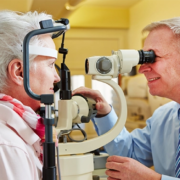For elderly loved ones with diabetes, one of the complications that can occur is diabetic retinopathy. This disease can lead to blindness at the worst and vision loss at the best. Diabetes inflicts damage on tiny blood vessels which are located inside the back of the eye in the retina. A healthy retina is crucial for good vision.
Some facts about diabetic retinopathy
- Usually affects both eyes
- It gets worse over time and can lead to vision loss
- There are some laser treatments available to reduce risk of blindness but must be given at the right stage to be of the most benefit
- Affects people with poorly controlled diabetes
- Affects people on insulin
- Can affect those who have had diabetes for a long period of time
- Doesn’t really cause any symptoms until the loss of sight begins to occur in the late stages
The dos and don’ts of diabetic retinopathy
- Do: reduce your risks by controlling your blood glucose levels
- Do: see your doctor regularly to make sure blood pressure levels are good
- Do: see a vision professional if you have sight problems
- Do: keep all your regular screening appointments
- Do: abstain from smoking
- Do: have your blood cholesterol levels checked on a regular basis
- Don’t: ignore symptoms
- Don’t: skip eye exams
If your loved one has been diagnosed with this disease, make sure you know what stage they are in, what their treatment options are, and what protocols their doctor wants them to follow. You can also get a good idea of what to expect. This will help you prepare for increased levels of assistance for your loved one over time.
Did you know that elderly care providers can help with much more than home care? When people think of caregivers they think of someone who will come in and help your loved one with bathing and cleaning up after meals. These are very important tasks indeed, but it goes much further than that.
For elders who are at home alone all day, life can get so quiet and lonely. Loneliness and depression are serious conditions for elders because they can be the start of a downward spiral. Just think how much your loved one would enjoy having someone to talk to every day, someone who will listen to them. They would have a companion who would play games with them and take them out to do things. Elderly loved ones need to get out of the house to get fresh air and to socialize with other people. It contributes to greater mental and physical health and well-being. The elderly loved one may forget doctor’s appointments or vision check-ups. A caregiver can help them remember and even take them to their appointments and accompany them so they can write down the doctor’s treatment plan.


